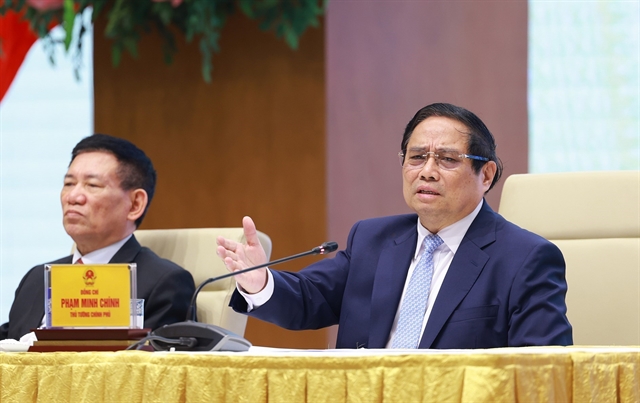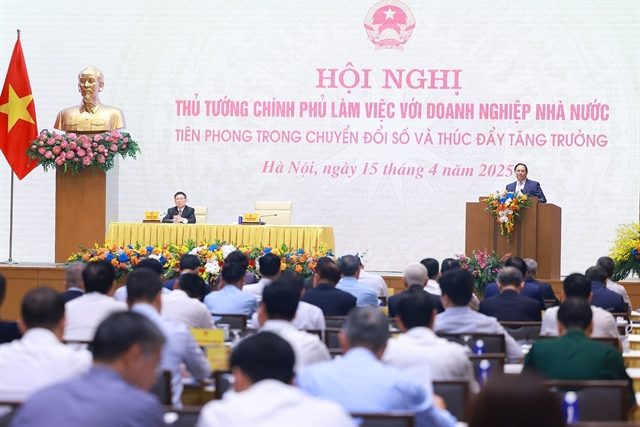.jpg) Economy
Economy

 |
| Prime Minister Phạm Minh Chính speaks at the meeting with representatives from SOEs pioneering in digital transformation in Hà Nội on Tuesday. — VNA/VNS Photo Dương Giang |
HÀ NỘI — State-owned enterprises (SOEs) should continuously grow and take the lead in driving digital transformation, technological innovation and creativity, said Prime Minister Phạm Minh Chính.
Charing a meeting with representatives from SOEs pioneering in digital transformation in Hà Nội on Tuesday, PM Chính called on SOEs to show stronger resolve, enhance efforts, and take more decisive action to overcome current challenges and drive rapid, sustainable development.
The PM reaffirmed the Government’s full support for their initiatives.
Highlighting Việt Nam’s limited resilience to external shocks, PM Chính stressed the importance of remaining calm and vigilant while fostering greater self-reliance and adaptability amid global uncertainties.
He acknowledged a range of existing challenges, including lingering impacts of the COVID-19 pandemic, geopolitical conflicts disrupting supply and production chains, monetary policy shifts in major economies, and ongoing difficulties in Việt Nam’s stock, real estate and corporate bond markets. Natural disasters have also added to the complexity of the current economic landscape.
In response, the Government is pursuing strategic breakthroughs in science and technology, innovation and national digital transformation. Efforts are also underway to streamline the political apparatus and restructure local administrative units, boost the development of the private economic sector, and strengthen international integration.
The Prime Minister emphasised three core pillars for national advancement, including improving and finalising institutional frameworks, developing strategic infrastructure, and building a highly skilled workforce.
“The world appears to be facing a trade war,” the Prime Minister warned, stressing that Việt Nam must not rely on a single market or a single growth driver such as exports. Instead, he urged diversification in products, production, and supply chains to ensure sustainable growth.
Delegates at the meeting were encouraged to thoroughly assess the current situation and propose breakthrough solutions. The PM emphasised the importance of implementing decisive, harmonised policies to meet the country’s ambitious 2024 growth target of at least 8 per cent, while also ensuring macroeconomic stability, controlling inflation, maintaining key economic balances, and improving both material and spiritual well-being for the people.
Making significant contributions but shortcomings persist
According to the Ministry of Finance, as of 2024, Việt Nam had 671 SOEs with total assets exceeding VNĐ5.6 quadrillion (over US$216 billion). These enterprises held nearly VNĐ3 quadrillion in equity, generated nearly VNĐ3.3 quadrillion in revenue, and recorded a pre-tax profit of more than VNĐ227 trillion.
SOEs’ projects are concentrated in key sectors and areas of the economy, contributing to implementing the country's socio-economic development goals.
Despite notable contributions, Deputy Minister of Finance Nguyễn Đức Tâm acknowledged that SOEs still face significant shortcomings in implementing digital transformation and innovation.
Operational efficiency remains below expectations relative to the vast resources they control, Tâm said, adding that limitations persist in competitiveness, science and technology capacity, and the pace of innovation in business management tools.
Many SOEs have yet to master core technologies essential to digital transformation, highlighting the urgent need for greater adaptability and strategic investment in modern capabilities.
Moving forward, SOEs need to prioritise capital allocation for digital transformation with clear, measurable progress, Tâm said.
He urged enterprises to strengthen collaboration with domestic digital technology firms to increase the localisation of platform technologies and solutions, particularly in areas such as cloud computing, Artificial Intelligence (AI), and big data.
The deputy minister also called for greater investment in emerging technologies and services like 5G and AI, as well as a sustained focus on fortifying network infrastructure and disaster prevention.
In addition, he encouraged SOEs to expand infrastructure for manufacturing and high-tech industries and to continue executing large-scale construction projects to support production and business operations.
 |
| A view of the meeting. — VNA/VNS Photo Dương Giang |
Suggestions from businesses
During the conference, Huỳnh Quang Liêm, General Director of VNPT, emphasised that digital transformation in business operations, management, and administration is essential in today’s evolving landscape.
He noted that this is particularly crucial for service providers like VNPT, where digitalisation plays a central role in maintaining competitiveness and meeting modern customer demands.
As a pioneer in digital transformation, VNPT is leveraging its operational capacity and a customer base of hundreds of thousands to drive practical digital solutions, Liêm said, expressing the group's desire to partner with the Government to implement these solutions nationwide, positioning digital transformation as a powerful lever to boost labour productivity, enhance operational efficiency and unlock new growth opportunities for enterprises across all sectors.
He noted that with the evolution of digital transformation, driven by big data, artificial intelligence, and locally developed applications, VNPT is committed to supporting Vietnamese businesses in harnessing digital tools for smarter management and governance.
Liêm said VNPT aims to accompany more enterprises in replicating successful models, helping them apply digital transformation effectively for sustainable development.
While emphasising the need to prioritise digital transformation opportunities for SOEs, Lưu Trung Thái, Chairman of the Board of Directors of MB, proposed that the Government focus on supporting large-scale technology and new platform projects to reinforce the leadership role of SOEs in driving national innovation.
Additionally, Thái suggested allowing SOEs to adopt salary payment mechanisms similar to those of private enterprises. This, he argued, would enable SOEs to align compensation with performance, drawing from their revenue and profit to reinvest in digital transformation initiatives.
Chairman of Petrovietnam's Board of Directors Lê Mạnh Hùng presented three key recommendations to the Government aimed at accelerating large-scale energy projects.
He proposed restructuring the resource tax policy, particularly for gas resources, to better incentivise the development of major energy projects.
Additionally, he urged the Government to allow Petrovietnam to directly assign tasks within its internal ecosystem, noting that the current mandatory bidding process for intra-group projects significantly delays implementation.
Hùng also recommended leveraging the capacity of domestic commercial banks to finance large-scale projects involving foreign technology. Specifically, he called for the State's approval to enable Vietnamese banks, including PetroVietnam’s own Petrocombank, to provide financial support for such strategic initiatives. — VNS




